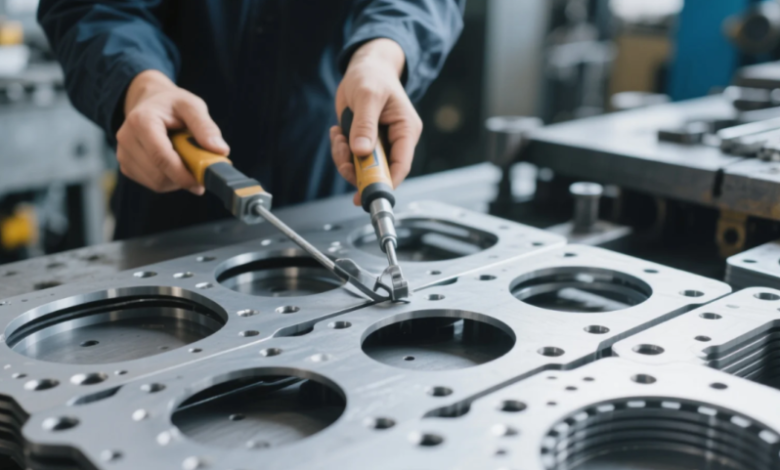Choosing the Right Metal Stamping Parts Manufacturer for Your Business

Introduction to Metal Stamping Parts
Metal stamping parts play a crucial role in modern manufacturing. They are essential for industries ranging from automotive and electronics to construction and industrial machinery. Working with a reliable metal stamping parts manufacturer ensures high-quality, precise components that meet both performance and durability standards.
Understanding the Metal Stamping Process
Metal stamping involves transforming flat sheets of metal into custom shapes using dies and stamping presses. This process can include various operations such as punching, bending, blanking, embossing, and coining. Depending on production requirements, manufacturers may use single-station, progressive, or transfer stamping techniques to achieve precision and efficiency.
Advantages of Metal Stamping Parts
High Accuracy and Consistency
One of the main benefits of metal stamping is its ability to produce components with tight tolerances and consistent quality. This precision is vital in applications where components must fit perfectly, such as in automotive assemblies, electronic devices, and industrial equipment. Reliable consistency also reduces production errors and increases overall product quality.
Cost Efficiency
Metal stamping is highly cost-effective for high-volume production. After the initial die creation, large quantities of parts can be produced quickly, reducing labor and material costs. This makes it an ideal choice for businesses looking to manufacture components efficiently while maintaining competitive pricing.
Material Versatility
A metal stamping parts manufacturer can work with a wide range of metals, including stainless steel, aluminum, brass, copper, and other alloys. Selecting the right material ensures that the stamped components meet requirements for strength, durability, and corrosion resistance.
Key Applications of Metal Stamping Parts
Automotive Industry
The automotive sector relies heavily metal stamping parts manufacturer on stamped components for parts such as brackets, body panels, engine mounts, and structural reinforcements. The precision and durability of these parts contribute to vehicle safety, performance, and longevity.
Electronics and Electrical Applications
Metal stamping is used to produce connectors, terminals, enclosures, and heat sinks in electronics. Accurate stamping ensures reliable electrical connections, supports compact designs, and improves the overall performance of electronic devices.
Industrial Machinery and Construction
Metal stamping parts are critical in manufacturing industrial machinery and construction equipment. Components like gears, housings, fasteners, and brackets require precise tolerances to ensure smooth operation and reduce maintenance needs.
See also: futuristic teleportation technology concept
Choosing a Reliable Metal Stamping Parts Manufacturer
Evaluating Production Capabilities
When selecting a manufacturer, it is essential to assess their equipment, production capacity, and technical expertise. Advanced presses, automation, and skilled technicians indicate that a manufacturer can handle large orders while maintaining consistent quality.
Quality Control and Compliance
A reputable metal stamping parts manufacturer implements strict quality control measures. This includes dimensional inspections, material testing, and defect monitoring. Certifications such as ISO 9001 demonstrate compliance with global quality standards and ensure reliable production.
Design and Engineering Support
Manufacturers offering design and engineering support can optimize your component design for manufacturability. Advice on die design, material selection, and process improvements can reduce costs, enhance part performance, and ensure that custom requirements are met.
Modern Trends in Metal Stamping
The metal stamping industry is evolving with innovations such as robotic automation, CNC stamping equipment, and precision tooling. These advancements improve production speed, reduce waste, and increase accuracy. Additionally, the use of lightweight and advanced materials enables innovative designs for automotive, aerospace, and electronics applications.
Benefits of Long-Term Partnerships
Building a long-term relationship with a trusted metal stamping parts manufacturer offers multiple advantages. Businesses gain consistent quality, faster production times, and better collaboration on new designs. Long-term partnerships also allow for process optimization and innovation, keeping companies competitive in the manufacturing sector.
Sustainability in Metal Stamping
Leading manufacturers are adopting sustainable practices, including recycling scrap metal, reducing energy consumption, and minimizing waste. Sustainable metal stamping processes not only benefit the environment but also enhance cost-efficiency and meet growing regulatory demands for responsible manufacturing.
Conclusion
Partnering with a skilled metal stamping parts manufacturer is critical for obtaining high-quality, precise, and reliable components. Evaluating production capabilities, quality control measures, and design support ensures successful outcomes for both standard and customized projects. Long-term collaboration with a trusted manufacturer can optimize efficiency, reduce costs, and foster innovation in the competitive world of manufacturing.




